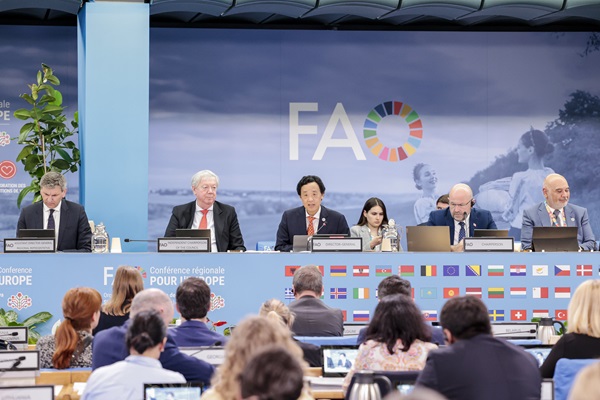
Rome — The 34th Session of the FAO Regional Conference for Europe (ERC) ended today following four days of exchanges on the steps needed to transform agrifood systems in Europe and Central Asia.
The ERC offered 53 Member countries from Europe and Central Asia the opportunity to exchange knowledge and best practices and discuss the most suitable responses to the multiple challenges facing their region, from the ongoing war in Ukraine to the climate crisis.
Held over four days at FAO’s headquarters in Rome, the Conference helped identify the priorities needed for the organization “to do more and better,” FAO Director-General QU Dongyu said.
The Director-General expressed special thanks to the Deputy Prime Minister and Minister of Agriculture of the Republic of Moldova, Vladimir Bolea, for his leadership and guidance as Chair of the regional ministerial conference.
During their meeting on 14-17 May, ERC Members highlighted the role of innovation and digitalization in the sustainable use of natural resources. This was done through a ministerial session that explored climate-resilient and low-emission approaches to managing the region’s land, forest, and water resources.
The ERC also identified achieving FAO’s Four Betters and the Sustainable Development Goals – especially SDG 2 on ending hunger and malnutrition – as critical for the Europe and Central Asia region.
Participants were able to share information on issues of common interest, including climate action in agrifood systems, water resource management, true cost accounting, and sustainable locust management.
They were also encouraged to engage in strategic, long-term thinking about the future of food and agriculture through a dedicated session on Foresight Drivers and Triggers. This session invited them to play out various scenarios and reflect on the link between short-term pressures and future trends.
Landlocked challenges
A side event on the challenges of agrifood systems transformation in landlocked developing countries (LLDCs) emphasized issues for these specific countries in the Region - Armenia, Azerbaijan, Kazakhstan, Kyrgyzstan, North Macedonia, Republic of Moldova, Tajikistan, Turkmenistan, and Uzbekistan.
Due to the absence of direct access to the sea, these countries face significant increases in transportation costs, limited access to international markets, and complex import-export procedures, which can significantly hinder agricultural development and food security. They are also on the front lines against the negative impacts of climate change. Severe weather events affecting Members recently include devastating droughts in the Republic of Moldova in 2022 and massive flooding in Kazakhstan earlier this year.
However, the Director-General said in his address to the event earlier today that such challenges also offer opportunities.
“By embracing innovation, strengthening partnerships, and leveraging technology, LLDCs can unlock the potential of their agrifood systems to drive economic growth, ensure food security, and mitigate the impacts of the climate crisis,” he said.
The side event was also addressed by Uzbekistan’s Minister of Agriculture, Ibrokhim Abdurakhmonov, who spoke about his country’s challenges and its strategy in favour of market-driven agriculture.
The ERC also showcased some of the FAO activities that are helping transform the agrifood systems of the Region’s LLDCs, such as the Hand-in-Hand Initiative and the Mountain Partnership.